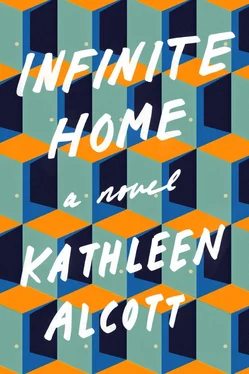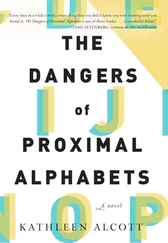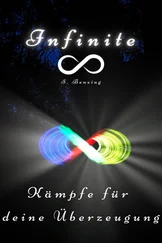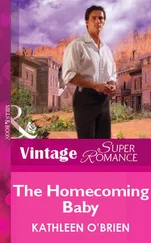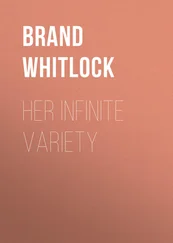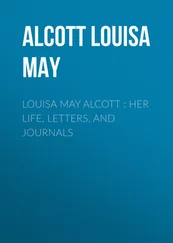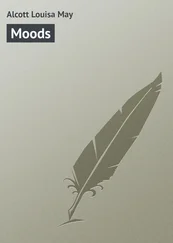A shelf displaying twenty century-old glass soda bottles, a jar holding a massive tangle of skeleton keys, a box of discarded photos detailing a 1967 vacation to Hawaii, a radio whose speakers had broadcast World Wars I and II: she told herself she was honoring the lives of the people who had touched and loved these objects, remembering them in a way that their death had otherwise precluded. What had begun as a collection of oddities had eventually crowded out reason, and soon required two walls of sagging floor-to-ceiling shelving.
Adeleine’s parents loved to tell her what a happy child she’d been, loved to present this and let the questions that followed arise tacitly. She resented the presupposing. She pointed out that while they may have found endearing the energy their six-year-old daughter had spent writing and illustrating a book about jellyfish who felt invisible against the dark of the ocean, the pages probably pointed to something larger.
Adeleine received her diagnosis, after a period of five days’ virtually uninterrupted sleep, from a sweatered psychiatrist in a small corner office at the college health center. She accepted it without surprise. She agreed to try the pills, to consider depression as a disease. She opted to keep all this from her parents. She assented to the distraction of a double major in music and literature, to the praise from professors who were quick to label her essays “multilayered” and “blooming.” She began to drink an awful lot, despite this course of action coming not exactly recommended as company to the orange bottles she got filled and refilled under fluorescent lights.
Why was she so sad? The unspoken question had dangled over the beige couch and the framed degrees and the economy Kleenex. He commanded a cache of Oh s and I see s in varying grades of volume and texture, knew when to prod and when to sink with her. Why was she so sad?
Adeleine was sad because she was sad because she was sad. She experienced extreme difficulty in reaching past the tautological. Sick of being asked, after six weeks of treatment, she slipped a brief and incomplete laundry list under her psychiatrist’s door. It read:
Because how are you supposed to draw a map for the future and believe it will apply at all
Because my father corrects my mother’s speech until she stops speaking
Because there are lives more or less completely forgotten with every minute
Because I’m supposed to think it’s normal and comfortable to learn, through a lit-up screen and a cheery blue website, how every person I ever knew is failing or fulfilling their potential
Because we value things we can touch less and less every day
Because it gets dark every single night
After that, she never went to the little office anymore and avoided passing it, though she could always sense it from across the trimmed lawn, the concrete staircase that descended from the bright world of couples splayed on the grassy grounds to the subterranean entrance.

EDITH SAW IT EARLY ON, the way her children curved out to such opposite ends, far from most and still further from each other. Even when Jenny was a child, her imagination, the point from which she saw the world, seemed too remote. She once gathered up a basket of flowers in Fort Greene Park and, while Edith wasn’t looking, ingested all of them. Edith turned and saw the last of the stems peeking out the sides of her eight-year-old’s mouth, the peach-soft skin already turning drab with nausea. Jenny had vomited for hours, and Declan, leaning on the bathroom door, shifting between worried and amused, repeated to himself, “Loved the flowers so much she had to eat ’em!” But Edith saw nothing funny about it. You weren’t supposed to swallow up beauty whole, weren’t supposed to rip it from its nest and insist it was yours alone.
Owen, on the other hand, was sovereign from the first. When he was a baby, Edith would sometimes rock him and get the feeling it was more for her peace of mind than his. He had learned to use the telephone in a single afternoon — Edith watched as his fingers spun the rotary with efficacy — and had called the bank and asked about opening an account. Edith, listening from the kitchen, could tell that the person on the line had asked his age from his answer. “Six,” he said. “But I have twice as many dollars as years.” Since asking for and receiving them for Christmas that year, he had carried a wallet and a comb, had taken to sweeping his room and whistling.
These were the stories she had told her friends, though she framed them as entertainments and withheld the starved feeling they gave her. Of course she loved her children — this was never in doubt — but when they became, more and more, the people they were, Edith felt as though nothing she could have done would have made any difference. She prayed for them in ways she knew were ridiculous: Dear God in Heaven, it’s fine if they both have to be alone , she bargained, but could they at least be alone together? Could you send down some shared interest? Once she whispered to Declan, “I could hang a thousand Christmas ornaments from the ceiling and these kids still wouldn’t look up.”
The summer Owen turned a confident nine and Jenny remained a childish twelve, he had assembled a Popsicle stand from cardboard, painted it carefully to resemble a storefront, and made his first sale minutes after opening. Edith, watching from the window, had called to Jenny in the living room behind her. “Why don’t you go join your brother,” she’d said, painting cheer onto her voice. “I bet if you offered help refilling the cooler with ice, or making change, he’d cut you a bit of the profit.” Instead, Edith had observed as Jenny slumped out, barefoot, squinting, and crumpled on the concrete some ten feet from Owen. From the pocket of her cutoffs she had removed a number of stones — treasures, Edith knew, from a creek they’d walked along on a rare trip upstate — and set them in a ragged line, occasionally pushed at one with a big toe. When a neighbor, Popsicle in hand, drifted with pity to Jenny’s odd station and asked how much, Edith had strained to hear her daughter’s faint reply. “Free,” she had said, barely moving her head from its place between her raised knees. “Came from water.” The man nodded and moved on empty-handed, and Owen had laughed like he did at the stupidity of half-wit cartoon characters, the ragged coyote who looked down his fate only after passing the end of the cliff.
Jenny spent the next six years growing more inscrutable, drawing vast spirals in her school notebooks and keeping odd pets, toads and then millipedes that Edith and Declan had paid for as though they were lottery tickets, chances to make their daughter’s life rich. She left for San Francisco the day she turned eighteen. Declan, who liked to believe himself wild, the kind of person who could appreciate the untamed in others, told Edith not to worry, but she already knew: she had already spent more time losing her daughter than she had having her. Jenny bought a rose suitcase and painted it with words from a song she liked; Jenny brushed out her always-tangled just-brown hair in their bathroom one last time; Jenny put on teal eye shadow that looked to Edith like the color of an empty hospital room; Jenny took the bag of fruit Edith had prepared; Jenny hugged each of them, and then Jenny was gone. She sent three progressively more disturbing postcards that said things like Really letting my body return to the earth and I speak a new language every day , and then one day they saw her on television. The news special about Haight Street and all the young people and all the sex and all the drugs, and then, for an excruciating twenty seconds, Jenny, writhing. She wasn’t wearing enough, a paisley handkerchief stretched taut across her chest, jeans mutilated and discolored. Sitting in the lap of a bearded man in a crocheted vest who held her by the waist, she chewed on a piece of her own hair as though hoping to extract something vital, and her eyes with their enormous pupils lolled. She kept moving her hands up and out, rhythmically, as if trying to keep some wall from caving in. “Aren’t you concerned about her?” asked the reporter. And the man shrugged: “She’s not mine, man.”
Читать дальше
